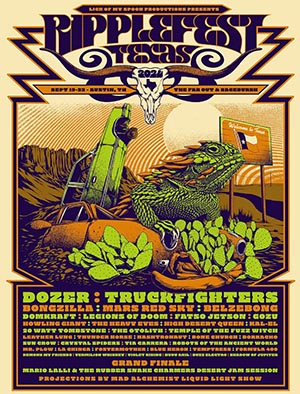
Van Der Graaf Generator was an enigma from the start, and remain just as mysterious over 35 years later. From the beginning they defied easy categorization. They didn’t fit easily into the niches of psychedelic rock, folk, jazz fusion or progressive rock, yet there were all of those elements and more. At the peak of the punk era, when the bloated circus road shows of Pink Floyd, Yes and Genesis were dismissed by punkers as irrelevant, Johnny Rotten famously gave props to Van Der Graaf singer Peter Hammill during a radio show. Mark E. Smith of The Fall was also a fan. It’s easy to hear why. When other progressive bands were polishing their schtick into static performances, Van Der Graaf Generator embodied that restless, questing spirit that led to constant change. They never played the same songs the same way, often pushing themselves to the point failure, alienating half their audiences. This of course sabotaged their commercial viability, but generated awe and respect mostly among fellow musicians.

After a tentative start with 1968’s Aerosal Grey Machine, the band gelled with 1970’s The Least We Can Do Is Wave To Each Other (taken from a John Minton quote, “We’re all awash in a sea of blood, and the least…”). Hammill’s talents as a worldly lyricist become apparent as he tackles mysticism, numerology, religion and even the Spanish Inquisition in “White Hammer.” On “Refugees” he takes a more personal slant with the melancholia of fading friendships. The music at times had the folksy feel of the Canterbury scene, though they didn’t really listen to any contemporary bands at the time. While they may have had kindred spirits in the Soft Machine’s Robert Wyatt, King Crimson’s Robert Fripp and Gong, Van Der Graaf Generator sounded like no one else. The remaster salvages the horrible original CD transfer, adds the “Refugees” single and its B-side, and sounds brilliant.

He To He Who Am The Only One (1970) is another step forward, with Hammill’s lyrical concerns extending to science fiction themes, given a dark veneer with the powerful, ominous sounds of a Hammond organ. “Killer” is more haunting and powerful than anything by Black Sabbath or Deep Purple, while Robert Fripp guests on “Emperor In His War Room.” An intriguing bonus track is “Squid/Octopus,” a 15:24 live favorite that gets an unhinged live-in-the-studio performance some time before commencing sessions for Pawn Hearts, which brought its madness to a peak as one of the most uncompromising albums of the early 70s.
Experimentation with electronics gave their sound an edge that sounded even more evil than before, creating a truly monumental clash of beauty, chaos and horror, particularly in the featured composition, “A Plague Of Lighthouse Keepers.” Fripp contributes guitar for on the whole album, a generous gesture, considering the fact that he essentially voluntarily passed the torch from King Crimson to Van Der Graaf Generator as the most vital, heavy, badass progressive rock band in 1971. The remaster adds several solo compositions from each of the members. After several exhausting tours of Italy and Europe, the band took a hiatus as Hammill tried his hand (quite successfully) at some solo work. In two and a half years, the band would return stronger than ever.

March 29, 2024
Fester’s Lucky 13: 1994
January 4, 2024
Fester’s Lucky 13: 1989
December 1, 2023
Fester’s Lucky 13: 2023 Year-End Summary



